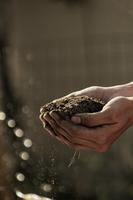Innovation is the process of recognising and pursuing potential that has not yet been realised. It starts with a question that challenges the status quo to seek new solutions.

For most people the innovation process starts with a motivating event, challenge or crisis. It can be financial, health-related, philosophical or inspirational. A smaller group of people are natural innovators, constantly seeking improvement.
Agriculture has always had its innovators. In the 21st century, farmers face the challenge of growing enough food and fibre to meet the demand from an increasing world population in a changing and sometimes unpredictable climate and, at the same time remaining profitable and taking care of the environment. The Wet Tropics region embraces these challenges and its farmers need to play their part.
Challenges also provide the catalyst to rethink what we do and develop innovative approaches to problems. Embarking on an innovative path can be painful and lonely at times but the benefits continue to reaffirm our region’s farmers as world leaders in tropical agriculture, and secure a viable and positive future for the region’s communities.
Soil Health Hub
The Wet Tropics Plan for People and Country provides access to an innovation network for sharing information on a global scale to helps farmers meet these challenges. The Soil Health Hub, for example, sets out principles for regenerating the productive capacity of agricultural soils, examples of where these principles are demonstrated in the Wet Tropics, and signposts to where to find resources for workshops, backed up by a range of technical and research documents from around the world on agriculturally-relevant topics.
The Innovation Cycle
Change can be uncomfortable. New ideas and innovations are often confronting and viewed with mistrust. Agricultural innovators can face challenges in progressing their ideas and having them accepted as mainstream practice.
They have to navigate obstacles such as the wariness of other farmers, unsupportive policies, insufficient resources and limited access to locally-relevant information and technical support.

This diagram shows the stages that an ‘innovation’ may go through before becoming ‘normal agricultural practice’.
At each stage, as innovators face obstacles, an innovation may ‘fall off’ the cycle and progress no further.
Stage 1: A new idea
A new idea is born, but is not yet tested. This idea may be based on other innovations or practices from within or outside the innovator’s industry, or may be an entirely new approach.
Stage 2: Informal testing
The innovator has already undertaken their own tests (often independently) and are finding promising results. However, they have not applied any rigour to the testing (e.g. insufficient documentation).
Stage 3: Validation
Credible testing/trials are undertaken to validate the results of the innovation, sometimes in partnership with researchers and industry.
Stage 4: Early extension
Validated innovation practice is extended to ‘early adopters’ who are interested in applying the practice and further testing it, prior to mainstream introduction.
Stage 5: Adoption as new “best practice”
Broad-scale uptake by industry.
Support for innovators of the Wet Tropics region
The Wet Tropics continues to produce remarkable innovators, including farmers, who are prepared to think outside the square, take ideas from elsewhere and apply them here, or give them a unique twist and come up with something entirely new. Read about some of the Wet Tropics agricultural innovators here.
Innovation requires a certain amount of risk-taking in order to forge a path to build agricultural systems that are more productive, profitable and socially and environmentally sustainable.
There is a range of support that can be accessed in the Wet Tropics region, including through Terrain NRM, researchers, industry bodies and agronomists.
For more information on the support available, contact the Regional Agriculture Landcare Facilitator.

